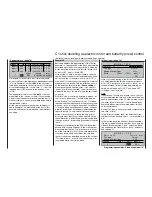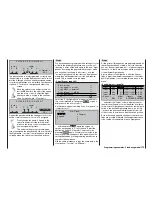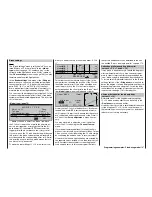
172
Servos running in parallel
In many cases a second servo is required to run in
parallel with an existing servo; for example, if two air-
brake or spoiler servos are installed in the wings, or
separate elevators are each actuated by one ser-
vo, or a twin-fi n model requires two rudder servos, or
where two servos are required for a large control sur-
face due to the high forces involved.
In theory this task could be solved simply by connec-
ting the two servos together in the model using a con-
ventional Y-lead. However, this has the drawback that
the linked servos cannot be adjusted individually from
the transmitter, i. e. the basic advantage of the com-
puter radio control system – freely variable servo set-
tings – is forfeited.
The fi rst example describes the method of coupling
two airbrake or spoiler servos, the second a means of
controlling two or more throttle servos, and the third
the coupling of two elevator servos.
The example of “Two rudder servos” on the next page
describes the procedure for coupling a pair of rudder
servos; note that variant 1 – using a »
Dual mixer
« –
is always preferable for applications of this kind, as it
is easier and quicker to program this type of arrange-
ment. The second variant, using the »
Free mixers
«
menu, is more complex, but does provide for asym-
metrical and / or non-linear travel curves.
172
Programming examples: Fixed-wing model
Two airbrake or spoiler servos
We will assume that you have installed one servo in
each wing panel to actuate your airbrakes or spoi-
lers, and have left the default linear control curve in
the »
Channel 1 curve
« menu unchanged. We now
connect one of the two servos to the standard recei-
ver output, which is Output 1, and the second to any
vacant receiver socket 5 … 12, in our example output
“8”. Now move to the menu …
»Control adjust« (page 78)
… and select the FLIGHT PHASE INDEPENDENT
input 9 with the rotary control pressed in. Assign
“Transmitter control 1” to this input:
0% +100%+100% 0.0 0.0
0.0 0.0
ASY
SYM
ASY
SYM
SEL
SEL
0% +100%+100% 0.0 0.0
M
L
0%
0%
+100%+100% 0.0 0.0
+100%+100%
Cnt. 1
«Normal »
12
11
10
9
–time+
Input
Input
Input
Input
free
free
free
–
offset
The remaining entries can be left at the default va-
lues. If necessary, adjust the servo travel in the »
Ser-
vo adjustment
« menu, where you can – if required –
fi ne-tune the travels of servos 1 and 9 to match each
other.
However, in our example the second airbrake servo is
connected to output 8, so we now have to ensure that
our settings for input 9 actually arrive at receiver out-
put 8. To accomplish this we move to the menu …
»Rx. output swap« (page 153)
… and swap over the two servos 8 and 9:
SEL
7
7
9
10
8
9
10
M
L
8
S e r v o
S e r v o
S e r v o
S e r v o
R E C E I V E R O U T P U T
O u t p u t
O u t p u t
O u t p u t
O u t p u t
Note:
In theory “Transmitter control 1” can also be assig-
ned to the fl ight phase specifi c inputs 5 … 8. This is
an obvious choice if you (initially) do not plan to pro-
gram fl ight phases. Even so, we recommend that you
keep to the method as described, because if you sub-
sequently set up a series of fl ight phases, you may be
somewhat surprised to discover that only one airbra-
ke moves instead of both of them …
Multi-motor model aircraft
Of course, model aircraft with two or more motors can
also be set up as already described. The fi rst thrott-
le servo or the fi rst speed controller would be connec-
ted to (receiver) output 1 in the usual way, and every
other throttle servo (or every other speed controller)
would be connected to one of the vacant (receiver)
outputs 5 … 12. Transmitter control 1 can then be as-
signed to the inputs of the control channels which you
have selected, e. g.:
0% +100%+100% 0.0 0.0
0.0 0.0
ASY
SYM
ASY
SYM
SEL
«normal »
SEL
Cnt. 1
0% +100%+100% 0.0 0.0
M
L
Cnt. 1
0%
0%
+100%+100% 0.0 0.0
+100%+100%
Cnt. 1
12
11
10
9
–time+
Input
Input
Input
Input
free
–
offset
Summary of Contents for mx-24s
Page 1: ...1...
Page 19: ...19 For your notes...
Page 35: ...35 For your notes...
Page 41: ...41 41 For your notes...
Page 57: ...57 For your notes...
Page 63: ...63 63 For your notes...
Page 69: ...69 69 For your notes...
Page 85: ...85 85 For your notes...
Page 99: ...99 For your notes...
Page 143: ...143 For your notes...
Page 191: ...191 For your notes...
Page 212: ...212 212 For your notes...
Page 213: ...213 213 For your notes...
Page 214: ...214 For your notes...
Page 216: ...216...
















































